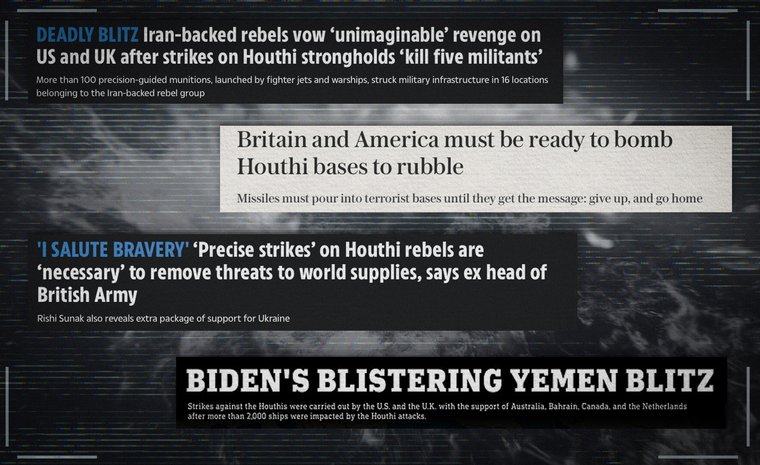Papers are trying to stir up enthusiasm for Britain’s time-old tradition of bombing Arabs, but is public mood shifting?
Bombs rained down from fighter jets under the cover of darkness as the UK and US pummelled Houthi targets in response to their Red Sea attacks,” pants The Sun. “The bold mission saw at least 60 targets hit in 16 locations across Yemen last night after the Iran-backed terror proxy threatened the West”.
The tabloid no longer publishes pictures of topless women, but it continues to get excited over war porn.
Under the headline “Deadly Blitz”, the UK’s most-read paper this morning ran on its website propaganda videos, provided by the Ministry of Defence, of jets taking off from the UK’s military bases in Cyprus and bombing Yemen.
The clips are described in lurid terms: “dramatic footage”, “huge explosions”, “formidable weapons”, “fiery blazes”, “the daring allied mission”, “fighters [sic] jets fuelled by plumes of fire could be seen soaring into the night at rapid speed”.
You can almost hear the paper whisper more explicit encouragement into its reader’s ear.
The Daily Mail had a slightly different angle. Its homepage played the same RAF footage on a loop, but this time alongside images of young, brown-skinned men waving Kalashnikovs and the headline: “West will pay heavy price.” Be afraid, it may as well have added.
Houthis, north-western Yemen’s de-facto government, have in recent weeks been attacking ships in the Red Sea that they say are linked to Israel or its allies, as a way of acting against the slaughter of Palestinians in Gaza.
Now, they are being bombed by the US and the UK – and the implicit message from Britain’s regime tabloids is clear: if bombing Arabs doesn’t fill you with feelings of zeal and thrill, are you really British?
Britain has, after all, been bombing the Middle East for more than a century. It’s a national tradition older than Monty Python or the monarch’s Christmas speech. Rallying support for it – and British foreign policy more broadly – is an important struggle for the British state.
That’s why the government has, in recent months, been desperate to show that the hundreds of thousands of us taking to Britain’s streets to protest the slaughter of Palestinians in Gaza are dangerous, Muslim and radical left outsiders and terrorist supporters: what France’s right wingers have managed to label Islamogauchists, or “Islamoleftists”.
It hasn’t worked. The latest polling shows British people are – marginally – more likely to sympathise with Palestinians than Israelis, and are – overwhelmingly – in favour of an immediate ceasefire. Thousands gather up and down the country to demonstrate against the slaughter every week, in an extraordinary ongoing wave of protests.
Throughout this period, our war-horny tabloids must have been desperately frustrated, yearning for British boys to somehow get in on the action so that they could ramp up the patriotic propaganda. Now, with the strikes in Yemen, they have their moment – a chance to denounce anyone who disagrees with them as opposing the bravery of British troops.
But the problem for the British state and its outriders in the tabloid press is that people increasingly have other sources of information, as well as their own minds and moralities.
It’s been 21 years since a million British people rallied against the Iraq War, and then saw that they had been right to do – that they had been wiser than their ruling class. But even back then, few had much sympathy for those Britain’s wars were being fought against.
This time may be different.
Israel has this week been in the Hague, fighting allegations that it is committing genocide in Gaza. If the International Court of Justice finds a genocide is indeed taking place, then Yemen, like every other state, has an “obligation to take measures to prevent” it, under the 1948 Convention on the Prevention and Punishment of Genocide.
In that case, huge numbers of British people are likely to conclude that the de-facto rulers of much of Yemen are right to blockade the perpetrators of the genocide. They may well oppose Britain’s military action not simply because they think it’s a bad idea, but because they can see a case for supporting what those being bombed say they are attempting to do.
The last few years in the UK have seen some fiery debates about our history, and whether we were always the good guys. The last few months, in which our leaders have largely sided with Israeli mass murder, have done more to damage the UK’s image – both internationally and among its own citizens – than any of that historical introspection ever could.
Now the government has committed British troops to the fight, we can expect that screaming tabloid defence of militarised Britishness to become more high-pitched. And we can expect more people than ever to turn against it.





